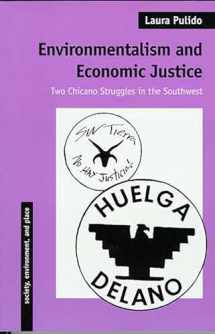
Environmentalism and Economic Justice: Two Chicano Struggles in the Southwest (Society, Environment, and Place)
ISBN-13:
9780816516056
ISBN-10:
0816516057
Edition:
First Edition
Author:
Laura Pulido
Publication date:
1996
Publisher:
University of Arizona Press
Format:
Paperback
282 pages
Category:
Earth Sciences
FREE US shipping
Book details
ISBN-13:
9780816516056
ISBN-10:
0816516057
Edition:
First Edition
Author:
Laura Pulido
Publication date:
1996
Publisher:
University of Arizona Press
Format:
Paperback
282 pages
Category:
Earth Sciences
Summary
Environmentalism and Economic Justice: Two Chicano Struggles in the Southwest (Society, Environment, and Place) (ISBN-13: 9780816516056 and ISBN-10: 0816516057), written by authors
Laura Pulido, was published by University of Arizona Press in 1996.
With an overall rating of 4.4 stars, it's a notable title among other
Earth Sciences
books. You can easily purchase or rent Environmentalism and Economic Justice: Two Chicano Struggles in the Southwest (Society, Environment, and Place) (Paperback) from BooksRun,
along with many other new and used
Earth Sciences
books
and textbooks.
And, if you're looking to sell your copy, our current buyback offer is $0.44.
Description
Ecological causes are championed not only by lobbyists or hikers. While mainstream environmentalism is usually characterized by well-financed, highly structured organizations operating on a national scale, campaigns for environmental justice are often fought by poor or minority communities. Environmentalism and Economic Justice is one of the first books devoted to Chicano environmental issues and is a study of U.S. environmentalism in transition as seen through the contributions of people of color. It elucidates the various forces driving and shaping two important examples of environmental organizing: the 1965-71 pesticide campaign of the United Farm Workers and a grazing conflict between a Hispano cooperative and mainstream environmentalists in northern New Mexico. The UFW example is one of workers highly marginalized by racism, whose struggle--as much for identity as for a union contract--resulted in boycotts of produce at the national level. The case of the grazing cooperative Ganados del Valle, which sought access to land set aside for elk hunting, represents a subaltern group fighting the elitism of natural resource policy in an effort to pursue a pastoral lifestyle. In both instances Pulido details the ways in which racism and economic subordination create subaltern communities, and shows how these groups use available resources to mobilize and improve their social, economic, and environmental conditions. Environmentalism and Economic Justice reveals that the environmental struggles of Chicano communities do not fit the mold of mainstream environmentalism, as they combine economic, identity, and quality-of-life issues. Examination of the forces that create and shape these grassroots movements clearly demonstrates that environmentalism needs to be sensitive to local issues, economically empowering, and respectful of ethnic and cultural diversity.


We would LOVE it if you could help us and other readers by reviewing the book
Book review

Congratulations! We have received your book review.
{user}
{createdAt}
by {truncated_author}




